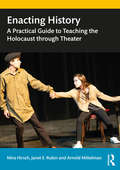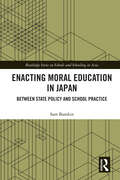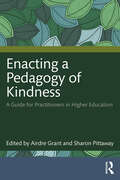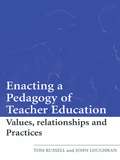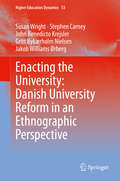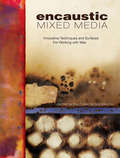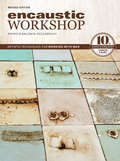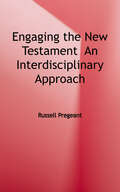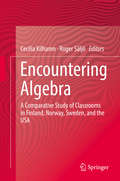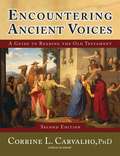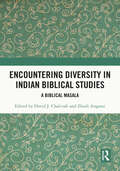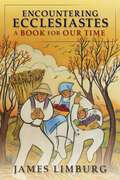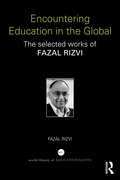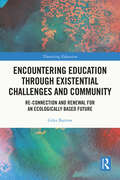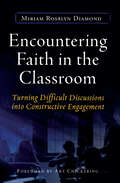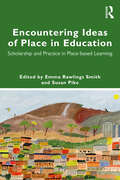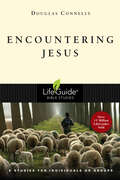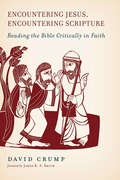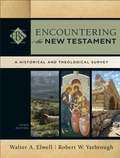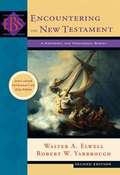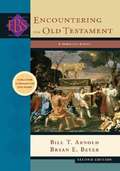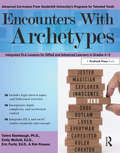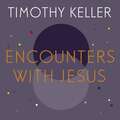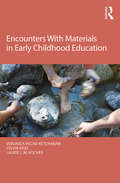- Table View
- List View
Enacting History: A Practical Guide to Teaching the Holocaust through Theater
by Janet E. Rubin Mira Hirsch Arnold MittelmanEnacting History is a practical guide for educators that provides methodologies and resources for teaching the Holocaust through a variety of theatrical means, including scripted texts, verbatim testimony, devised theater techniques and process-oriented creative exercises. A close collaboration with the USC Shoah Foundation I Witness program and the National Jewish Theater Foundation Holocaust Theater International Initiative at the University of Miami Miller Center for Contemporary Judaic Studies resulted in the ground-breaking work within this volume. The material facilitates teaching the Holocaust in a way that directly connects students to individual people and historical events through the art of theater. Each section is designed to help middle and high school educators meet curricular goals, objectives and standards and to integrate other educational disciplines based upon best practices. Students will gain both intellectual and emotional understanding by speaking the words of survivors, as well as young characters in scripted scenes, and developing their own performances based on historical primary sources. This book is an innovative and invaluable resource for teachers and students of the Holocaust; it is an exemplary account of how the power of theater can be harnessed within the classroom setting to encourage a deeper understanding of this defining event in history.
Enacting Moral Education in Japan: Between State Policy and School Practice (Routledge Series on Schools and Schooling in Asia)
by Sam BamkinDrawing on the case of moral education reform, this book provides an authoritative picture of how policy is enacted between state policymaking and school practice in Japan, focusing on how national policy is enacted locally in the classroom. The study follows the 2015 moral education reform from its genesis in central government, through the Ministry of Education to its enactment by local government and schools. The book looks beyond written policies, curricula and textbooks to examine how teachers, school administrators and others make sense of, and translate, policy into practice in the Japanese classroom context. Chapters explore how moral education practice has changed in response to the intentions of national policy, and analyzes the implications for understanding processes of policy enactment in the Japanese education system. This book presents a new perspective on the complexity of education policy making, practice, and the gaps in between. It will be of interest to postgraduate students, researchers, and academics in the fields of education policy and politics, moral education, school administration, and international and comparative education more broadly, particularly in Asia.
Enacting a Pedagogy of Kindness: A Guide for Practitioners in Higher Education
by Airdre Grant Sharon PittawayDrawing from the lived experience of educators, this book explores the concept of a pedagogy of kindness through practical applications and strategies for teaching in higher education.Conversational in tone, narrative-based and rich with practical stories, ideas, and strategies, this book provides guidance to help educators shape their teaching. It covers all aspects of teaching in higher education, including curriculum design, delivery, marking and feedback. Each chapter describes a specific perspective on practical applications of kindness, including authentic strategies used to increase positivity and connection in teaching and learning. Through a series of case studies, it provides relatable examples that educators can apply to their practices as they navigate a dynamic and rewarding teaching environment.This book will help educators who are keen to bring the joy back to their teaching and who want to connect with their students and see learning come alive again in higher education.
Enacting a Pedagogy of Teacher Education: Values, Relationships and Practices
by Tom Russell John LoughranBuilding on John Loughran’s latest work Developing a Pedagogy of Teacher Education, this book focuses on how individuals enact pedagogy in the context of teacher education. With teacher educators actually teaching while showing student-teachers how to teach, the quality of teacher education improves. Bringing together contributions from internationally known teacher educators, a school administrator who supports teachers’ professional learning, someone studying to become a teacher educator and someone studying to become a teacher, the book examines enacting educational and pedagogical values in personal practice and developing the interpersonal relationships that are so essential to quality teaching and learning. Each chapter illustrates an individual working to better understand the processes of teaching and learning and then modifying personal practices to enact a productive pedagogy of teacher education. This collection extends the rich literature emerging from the field while also focusing explicit attention on the challenges of enacting a pedagogy of teacher education.
Enacting the University: Danish University Reform in an Ethnographic Perspective (Higher Education Dynamics #53)
by Susan Wright Stephen Carney John Benedicto Krejsler Gritt Bykærholm Nielsen Jakob Williams ØrbergThis book examines the transformative power and the limitations of one of Europe’s most significant university reforms from an ethnographic and historical perspective. It incorporates voices positioned across university and policy-making hierarchies in its analysis of how Danish universities have been transformed. To do this, the book continually juxtaposes two meanings of ‘enactment’: a top-down view based on laws and institutional power, and a bottom-up view of multiple actors shaping their institution in day-to-day life and in actively contested changes. By conceiving of the university as ‘enacted’ in both ways at once, the book explores how and why the university comes to be imagined and instantiated in new ways. The book traces the arguments for reform through a two-decade long, dynamic struggle between international forums and national industrial, political and academic interests over the definition of the university. It discusses which ideas finally became dominant and how this happened. It looks at government reforms from 2003 onwards, and, by means of notable ‘telling moments’, explains how the governance and management of the university were transformed. It examines how academics found room to manoeuvre between contesting discourses that affect their identity and work. Finally, it shows how students engaged with new versions of historical debates about their participation in shaping their own education, their institution and society.
Encaustic Mixed Media: Innovative Techniques and Surfaces for Working With Wax
by Patricia Baldwin SeggebruchRusting and burning, carving and spackling, tarring and flocking: These are just a few of the unique and surprising techniques author Patrica "Trish" Baldwin Seggebruch shares with you in Encaustic Mixed Media! New to encaustic? With Trish leading the way, you can start today! And if you've dabbled in encaustic before, the creative approach and new materials and techniques used in this book will blow you away! Encaustic Mixed Media includes: Unexpected art supplies: From the hardware store to the art supply store, author Patricia Baldwin Seggebruch shatters the conventions of what are and are not art supplies. Shellac? Yes. Tar? Sure. Patching plaster? Of course! But it doesn't stop there. You'll mix these unexpected materials with some others that are a tad more traditional, like decorative papers, and pastels. Embellishment mini-demos: Why use ordinary, everyday embellishments when you can make cool ones yourself? Glue-molded structural elements and fire-treated papers and plastics: These are just a few of the unique embellishments you'll learn to create. Visual inspiration: Savor amazing combinations of color, texture and technique. Dozens of galley pieces throughout the book will make you want to get started right away!
Encaustic Workshop: Artistic Techniques For Working With Wax
by Patricia Baldwin SeggebruchIn its purest form, encaustic painting is as simple as applying melted beeswax to an absorbent surface. In Encaustic Workshop, Revised Edition, it becomes much more: a dynamic medium where anything goes and the possibilities are endless. Packed with step-by-step techniques, helpful tips and diverse examples of completed works, Encaustic Workshop, Revised Edition brings an encaustic workshop to your own workspace. If you're a beginner, you'll find everything you need to know to get started. If you're more advanced, you'll discover things you never knew you could do with encaustic. In this revised 10th anniversary edition, learn about new materials, surfaces and techniques that will take your encaustic paintings to entirely new level.
Encounter with the New Testament: An Interdisciplinary Approach
by Russell PregeantAn exemplary text, Russell Pregeant'sEngaging the New Testament (1995) has provided a rich interdisciplinary New Testament introduction for upperlevel and graduate students, incorporating a wide range of methodsliterary, historical, psychological, theological, and socialscientific, and critically perceptive introductions to each of the New Testament writings. <p><p>Encounter with the New Testament adapts and abridges the best features of that textbook for beginning undergraduate students surveying approaches to biblical studies, and discussing historical and cultural backgrounds, the historical Jesus, and the rise of the resurrection faith with attention to extracanonical materials. The textbook includes charts, maps, illustrations, reading suggestions, and more.
Encountering Algebra: A Comparative Study of Classrooms in Finland, Norway, Sweden, and the USA
by Cecilia Kilhamn Roger SäljöThe book reports a comparative research project about algebra teaching and learning in four countries. Algebra is a central topic of learning across the world, and it is well-known that it represents a hurdle for many students. The book presents analyses built on extensive video-recordings of classrooms documenting the first introduction to symbolic algebra (students aged 12 to 14). While the content addressed in all classrooms is variables, expressions and equations, the teaching approaches are diverse. The chapters bring the reader into different algebra classrooms, discussing issues such as mathematization and social norms, the role of mediating tools and designed examples, and teacher beliefs. By comparing classrooms, new insights are generated about how students understand the algebraic content, how teachers instruct, and how both parties deal with difficulties in learning elementary algebra. The book also describes a research methodology using video in search of taken-for-granted aspects of algebra lessons.
Encountering Ancient Voices: A Guide to Reading the Old Testament
by Corrine L. CarvalhoThe new second edition of Corrine Carvalho's widely popular core text maintains the features, pedagogy, and engaging style that made the first edition so effective and successful, while adding a new element that makes it accessible to even more students than ever. The tone of the text is inclusive and does not presume a specifically Christian or religious reader; there's a new key to biblical texts discussed in the book, listed in canonical order in the front matter of the book; and the style of the book brings the stories of the Old Testament to life for students. Flexible, understandable, and filled with sound pedagogy--chapter overviews and summaries; guided readings of key biblical texts; and unique sidebars focusing on different aspects of, themes in, and methods for interpreting biblical text--Encountering Ancient Voicessparks students' interest in theological questions by connecting their queries to their everyday world. With its focus on reading strategies and active learning techniques throughout, it's an approach that empowers students to read the Old Testament on their own.
Encountering Diversity in Indian Biblical Studies: A Biblical Masala
by Zhodi Angami David J. ChalcraftThis book provides analysis of a variety of biblical narratives and texts which are the vehicle for the expression, articulation and performance of diverse identities in the Indian context and is the first attempt to do so for a global audience of scholars and students. From pan-Indian social problems attributed to caste, class and gender inequality, to specific North Eastern tribal settings, Dalit struggles in rural Andhra Pradesh, and the experience of Christian autorickshaw drivers in urban Chennai, the book explores the diverse geographical, cultural, social, economic and linguistic settings in which the Bible is encountered. The holistic and multidisciplinary approach to Biblical studies adopted broadens the field beyond textual exegesis. Encounters with the Bible are revealed in diverse chapters impacted by contexts of caste realities, the history of Indian Christianity, colonial and post-colonial frameworks, and educational institutions. Full use is made of 'vernacular' texts and traditions including oral and written cultural, folk tale, literary and auto/biographical narratives in Tribal, Dalit and British colonial settings. Diversity of method is championed through including sociological analysis of Indian social realities, qualitative fieldwork techniques and a kaleidoscope of visual and sensory environments with over 30 photographs. The book celebrates and promotes diversity in Indian biblical studies, creativity and sometimes conflicting perspectives. Encountering Diversity in Indian Biblical Studies will be of interest to students, scholars, and researchers working on postcolonial biblical studies and diversity in Christianity, particularly in the Indian context.
Encountering Ecclesiastes: A Book for Our Time
by James LimburgThe book of Ecclesiastes speaks eloquently to the uncertainties and anxieties that people have experienced through the centuries. James Limburg brings this ancient book to life for readers in our probing, questioning twenty-first-century times. He illuminates the contemporary existential themes in Ecclesiastes -- the quest for meaning in life, the incompleteness of our knowledge, the place of work in human lives, and the need to discover God amid life's uncertainties. A fresh, relevant discussion, arising from Limburg's extensive teaching experience, Encountering Ecclesiastes is ideal for any reader seeking to understand the timeless wisdom of Ecclesiastes.
Encountering Education in the Global: The selected works of Fazal Rizvi
by Fazal RizviIn the World Library of Educationalists, international experts compile career-long collections of what they judge to be their finest pieces – extracts from books, key articles, salient research findings, major theoretical and practical contributions – so the world can read them in a single manageable volume. Readers will be able to follow the themes and strands and see how their work contributes to the development of the field. This volume brings together the selected works of Fazal Rizvi. Born in India, Fazal Rizvi has lived and worked in a number of countries, including Australia, England and the United States. Most of his educational encounters have been 'in the global'. He has developed a keen sense of the multiple and conflicting ways in which transnational ties and interactions are transforming the spaces in which identities and cultures are forged and performed, and in which education takes place. Much of his research has sought to examine how educational systems around the world have interpreted and responded to the challenges and opportunities of globalization. In this collection of his papers, written over a period of more than two decades, Fazal Rizvi seeks to understand the shifting discourses and practices of globalization and education, critically examining the ways in which these are: reshaping our sense of identity and citizenship, and our communities creating transnational systems of ties, networks and exchange taken into account in the development of policies and programs of educational reform producing uneven social effects that benefit some communities more than others. Fazal Rizvi's analysis shows how recent global transformations have mostly been interpreted through the conceptual prism of a neo-liberal imaginary that have undermined education's democratic and cosmopolitan possibilities.
Encountering Education through Existential Challenges and Community: Re-connection and Renewal for an Ecologically based Future (Theorizing Education)
by Giles BarrowDirectly inspired by Indian British activist Satish Kumar’s 2013 seminal work ‘Soil, Soul and Society’, this book rethinks education in line with thoughts around the current climate crisis, the purpose of education in a post-pandemic world, and the mental health of children, teachers and youth across societies. Acknowledging the realities of a world battling with the after effects of COVID-19, the author envisions a future for education that realises real-world solutions to contemporary existential, ecological and societal challenges that might otherwise be limited to an imaginary or idealist space. Offering a novel approach through a combination of narrative-based inquiry and auto-ethnographic study, the book provides a synthesis of ideas from both Kumar and political philosopher Hannah Arendt not usually linked to debates in sustainability education. Ultimately providing a critique of a predominantly Western-orientated, global education movement, this interdisciplinary book will appeal to scholars, researchers, and post-graduate students involved in education theory and the philosophy of education, as well as indigenous and sustainability education more broadly.
Encountering Faith in the Classroom: Turning Difficult Discussions into Constructive Engagement
by Miriam Rosalyn DiamondWhen faculty unexpectedly encounter students’ religious ideologies in the classroom, they may respond with apprehension, frustration, dread, or concern. Instructors may view this exchange as a confrontation that threatens the very heart of empirical study, and worry that this will lead to a dead-end in the learning process.The purpose of this book is to explore what happens—and what can happen—in the higher education, and even secondary school, classroom when course content meets or collides with students' religious beliefs. It also considers the impact on learning in an environment where students may feel threatened, angry, misunderstood, or in which they feel their convictions are being discredited,This is a resource that offers ways of conceptualizing, engaging with, and responding to, student beliefs. This book is divided into three sections: student views on the role of religion in the classroom; general guidelines for responding to or actively engaging religious beliefs in courses (such as legal and diversity considerations); and specific examples from a number of disciplines (including the sciences, social sciences, humanities and professional education). Professors from public, private, and religious institutions share their findings and insights.The resounding lessons of this book are the importance of creating a learning space in which students can express their beliefs, dissonance, and emotions constructively, without fear of retribution; and of establishing ground rules of respectful discussion for this process to be valuable and productive. This is an inspirational and practical guide for faculty navigating the controversial, sensitive—yet illuminating—lessons that can be learned when religion takes a seat in the classroom.
Encountering Ideas of Place in Education: Scholarship and Practice in Place-based Learning
by Emma Rawlings Smith Susan PikeThis book draws together theories, research, and practice on knowledges and pedagogies of place across educational settings. Using empirical research on learning across education systems, each chapter highlights different concepts of place in various contexts such as environments, understandings of place like those experienced by communities and opportunities for embedding place in learning. Chapters are co-constructed by authors working collaboratively across different contexts, tackling key themes such as justice, mobilities, changes, and sustainability, through place. The book indicates how educators can apply creative approaches to teaching within, through and about place in education and will therefore be of relevance to a wider range of academics, teachers and practitioners working in early years settings, schools, universities and other educational context.
Encountering Jesus (LifeGuide Bible Studies)
by Douglas Connelly®PDF download with a single-user license; available from InterVarsity Press and other resellers.
Encountering Jesus, Encountering Scripture: Reading the Bible Critically in Faith
by David CrumpPersonal, experiential faith is seldom given a seat at the table of academic theology and biblical studies. David Crump, however, with the assistance of Søren Kierkegaard's religious philosophy, claims that "authentic understanding, and thus authentic Christian commitment, can only arise from the personal commitment that is faith."Examining the various biblical, historical, cultural, theological, and academic hurdles demanding a truly Kierkegaardian leap of faith before one can meet the resurrected Jesus, Crump's Encountering Jesus, Encountering Scripture provides a very insightful discussion of key New Testament texts and issues revealing how Truth is discovered only through the subjectivity of faith.
Encountering The New Testament: A Historical And Theological Survey (Encountering Biblical Studies)
by Walter A. Elwell Robert W. YarbroughStudying the New Testament can be an exciting--and intimidating--experience. This readable survey is designed to make the adventure less daunting and more rewarding. The second edition has been revised throughout, including updated bibliographies and focus boxes addressing contemporary concerns. The CD-ROM has been substantially revised to provide a more helpful and up-to-date interactive learning experience. <P><P> Other distinguishing features include: <br>- abundant illustrations, photographs, tables, and charts-all in full color <br>- sidebars addressing ethical/theological concerns <br>- focus boxes isolating key issues <br>- learning objectives and a chapter outline <br>- end-of-chapter study questions, review questions, and chapter summaries
Encountering the New Testament: A Historical and Theological Survey
by Walter A. Elwell Robert W. YarbroughStudying the New Testament can be an exciting--and intimidating--experience. This readable survey is designed to make the adventure less daunting and more rewarding. The second edition has been revised throughout, including updated bibliographies and focus boxes addressing contemporary concerns. The CD-ROM has been substantially revised to provide a more helpful and up-to-date interactive learning experience. Other distinguishing features include: - abundant illustrations, photographs, tables, and charts-all in full color - sidebars addressing ethical/theological concerns - focus boxes isolating key issues - learning objectives and a chapter outline - end-of-chapter study questions, review questions, and chapter summaries
Encountering the Old Testament: A Christian Survey (2nd edition)
by Bill T. Arnold Bryan E. BeyerThe bestselling Encountering the Old Testament has become the leading Old Testament survey text. Now the second edition has been updated throughout with revisions to the text, sidebars, bibliographies, notes, and indexes. The book's numerous helpful features include sidebars, focus boxes, learning objectives, chapter outlines and summaries, and study questions.
Encounters With Archetypes: Integrated ELA Lessons for Gifted and Advanced Learners in Grades 4-5
by Tamra Stambaugh Emily Mofield Eric Fecht Kim KnaussEncounters With Archetypes integrates the study of archetypes with the concept of encounters. This unit, developed by Vanderbilt University's Programs for Talented Youth, is aligned to the Common Core State Standards and features accelerated content, creative products, differentiated tasks, engaging activities, and the use of in-depth analysis models to develop sophisticated skills in the language arts. Through the lens of encounter, students will examine the patterns, symbols, and motifs associated with common archetypes by analyzing fictional and informational texts, speeches, and visual media. Students will follow various archetype encounters with conflicts and challenges to explore questions such as “How do archetypes reflect the human experience?” and “How do archetypes reveal human strengths and weaknesses?" Ideal for gifted classrooms or gifted pull-out groups, the unit features texts from Sandra Cisneros, Louis Untermeyer, Rudyard Kipling, Emily Dickinson, and Maya Angelou; biographies of Oprah Winfrey, Mother Teresa, Jackie Robinson, Sally Ride, and Lin-Manuel Miranda; a speech from President Ronald Reagan; a novel study featuring Wonder by R. J. Palacio and/or Counting by 7s by Holly Goldberg Sloan; and art from Pieter Bruegel. Grades 4-5
Encounters With Jesus: Unexpected Answers to Life's Biggest Questions
by Timothy KellerWhat is my purpose in life? Who am I meant to be? How can I live a successful life? Why is there so much wrong with our world today? Am I part of the problem? What can I do to help change that? These are the big, seemingly unanswerable questions that everyone must ask and then answer in life. In Encounters With Jesus, New York Times-bestselling author and renowned pastor Timothy Keller explores Jesus' answers to life's biggest questions by showing what happened to those who met Jesus personally.Jesus changed the lives of nearly every person he met in the Gospels. These were powerful experiences that can have a profound effect on us today and help explain not only different aspects of Christianity, but the deep questions of life itself. Timothy Keller highlights ten of these encounters, including his meeting a sceptical student, a religious insider, an outcast, even Satan himself, and proves how invaluable the lessons from these encounters are for contemporary readers.(P)2013 Penguin Audio
Encounters With Materials in Early Childhood Education
by Veronica Pacini-Ketchabaw Sylvia Kind Laurie L. KocherEncounters with Materials in Early Childhood Education rearticulates understandings of materials—blocks of clay, sheets of paper, brushes and paints—to formulate what happens when we think with materials and apply them to early childhood development and classrooms. The book develops ways of thinking about materials that are more sustainable and insightful than what most children in the Western world experience today through capitalist narratives. Through a series of ethnographic events and engagement with existing ideas of relationality in the visual arts, feminist ethics, science studies, philosophy, and anthropology, Encounters with Materials in Early Childhood Education highlights how materials can be conceptualized as active participants in early childhood education and generators of human insight. A variety of examples show how educators, young children, and researchers have engaged in thinking with materials in early years classrooms and explore what materials are capable of in their encounters with other materials and with children. Please visit the companion website at www.encounterswithmaterials.com for additional features, including interviews with the authors and the teachers featured in the book, videos and photographs of the classroom narratives described in these pages, and an ongoing blog of the authors’ ethnographic notes.
Encounters With Materials in Early Childhood Education
by Veronica Pacini-Ketchabaw Sylvia Kind Laurie L. KocherEncounters with Materials in Early Childhood Education rearticulates understandings of materials—blocks of clay, sheets of paper, brushes and paints—to formulate what happens when we think with materials and apply them to early childhood development and classrooms. The book develops ways of thinking about materials that are more sustainable and insightful than what most children in the Western world experience today through capitalist narratives. Through a series of ethnographic events and engagement with existing ideas of relationality in the visual arts, feminist ethics, science studies, philosophy, and anthropology, Encounters with Materials in Early Childhood Education highlights how materials can be conceptualized as active participants in early childhood education and generators of human insight. A variety of examples show how educators, young children, and researchers have engaged in thinking with materials in early years classrooms and explore what materials are capable of in their encounters with other materials and with children.Please visit the companion website at www.encounterswithmaterials.com for additional features, including interviews with the authors and the teachers featured in the book, videos and photographs of the classroom narratives described in these pages, and an ongoing blog of the authors’ ethnographic notes.
